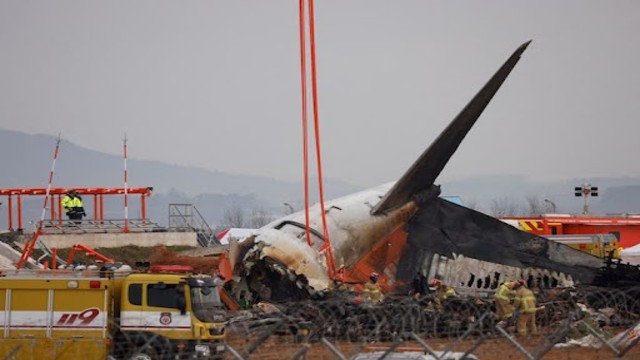
People gather near the remains of an aircraft that crashed after overshooting the runway at Muan International Airport in South Korea on December 30, 2024. Reuters
Investigators have discovered bird feathers and blood in both engines of a jet that crashed in South Korea last month, claiming the lives of 179 people. The fatal accident involved a Boeing 737-800 aircraft operated by Jeju Air. The plane had departed from Bangkok, Thailand, heading toward Muan County in southwestern South Korea when the tragedy unfolded.
Shortly before landing, the pilot reported a bird strike and declared an emergency. South Korean authorities revealed that air traffic control had earlier warned of bird activity in the area, urging caution. Despite this, the jet attempted to land, belly-landing on the runway, overshooting it, and ultimately crashing into an embankment. The impact caused the plane to burst into flames.
Of the 181 people on board, only two crew members stationed at the rear of the plane survived, making this the most devastating aviation disaster in South Korean history.
Authorities have since confirmed the presence of feathers in one of the engines, and video evidence indicates a bird strike occurred during the flight. A source familiar with the investigation stated that feathers and blood were found in both engines, suggesting the severity of the bird strike. However, the South Korean transport ministry has declined to officially confirm these findings.
The investigation faces additional hurdles as both of the plane’s black boxes stopped recording approximately four minutes before the crash. The black boxes, which typically store critical flight data and cockpit conversations, are essential for determining the precise sequence of events leading to the accident. Experts are puzzled by the data gap, with one former investigator, Sim Jai-dong, describing it as highly unusual. Sim speculated that all power, including backup systems, may have been completely lost, a scenario rarely encountered in aviation.
Bird strikes involving both engines are exceptionally uncommon. While such incidents have occurred, they are usually non-fatal due to the skill of the pilots. Notable examples include the 2009 "Miracle on the Hudson," where Captain Chesley Sullenberger safely landed a plane in the Hudson River after a bird strike disabled both engines, and a similar landing in a cornfield in Russia in 2019.
The tragedy has raised concerns about aviation safety and wildlife management near airports. Authorities are now examining how the incident could have been prevented and whether further measures are needed to mitigate bird strike risks.
As South Korea continues its investigation, the focus remains on uncovering the precise cause of this catastrophic accident, ensuring that such an event does not occur again.















